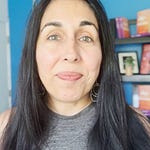‘I didn’t want to get my hopes up.’
’Hope feels useless.’
’Hope is toxic in this hopeless situation.’
We resist hope. All of the time.
My theory is twofold. We both don’t want to be ‘even more disappointed’ if our hopes don’t come true and we don’t want to dismiss or bright side the reality of the situation.
On a cognitive level, those two reasons may resonate. But if we break it down, they really aren’t valid. When it comes to your health, both physical and mental.
Now, I will not dismiss the stress and state of the world, much less anything going on in your personal life. This world is scary and in a constant state, it seems, of continually crumbling and shocking me on a daily basis. Some days I do wonder about the role of hope, I won’t lie.
But on those days, I then know my practice is to be with my emotions until I kindle Hope again. That is ok and THAT is part of a continual Joy practice because Joy emerges more strongly when we do not numb to pain.
But what I hear and see from patients is that even when it feels like hope could ignite again, there is fear or resistance to allowing it in. And that’s what I want to talk about today.
I get that it’s scary. I get that it’s hard. I get it because I am human too. But there are two critical reasons I want you to consider doing it anyway.
I. Hope is healthy
Plain and simple, hope is simply good for your health. Think of it as a supercharged supplement but even better because there aren’t any side effects or potential toxic additives. Studies have linked it to more happiness, less physical pain and even as a strong predictor of mortality. Yes, soak that in. Hope can cultivate longevity.
Even before scientists started studying hope as its own element, we have been studying the foundation of hope in research for decades, through the placebo effect. You participate in a treatment and your entire body wants to deeply believe it would work. And even though you didn’t receive the actual treatment, you do get better. You want to believe it is possible. And this placebo effect happens almost as much as half the time.
The research has gone further now, to even delineate the difference between hope and optimism which also has great health effects so feel free to also use optimism liberally, please. Both have been shown to improve heart health and well-being for example. But there is a difference that is worth mentioning here. The research shows that hope is more focused on personal goals whereas optimism more on the quality of the outcome.
Basically, hope makes no assumption that things will in fact be okay, but rather that your personal action will somehow make a difference if in even in only one small aspect. I don’t consider myself an optimist at heart. But I am incredibly hopeful always —for example, for there to be beauty, meaning and dignity in all of my suffering. I still feel the pain but I have hope for what I will find next to the suffering as well.
Hope primes your brain for what is possible instead of only the despair in front of you.
It lets you hold more than the one single story that is burdening you. It doesn’t dismiss the hard. It lets you acknowledge the despair today so you can hope for one small thing to be better tomorrow.
II Hope is your birthright
Hope lives in your body. It lives in your actions even when you don’t recognize it. When your mind wants to give up on the world, your body gets you up again the next day, however slowly that may be. That is hope in action.
Hope is the capacity to see the yet unseen.
I know it feels scary to harness it when life is hard. No one wants even more disappointment.
But what if you knew that hope can be for so much more than just a solution?
Hope can be to have a moment of ease in navigating a challenge.
Hope can be for a glimpse of beauty in a dark day.
Hope can be that you receive love and support when you need it most.
None of this is settling, it’s expanding what you look for.
And then that hope is a muscle you exercise until you can have more.
If you don’t have the energy to hope, you can ask someone else to hold it for you until you do.
I often say to patients who tell me they have ‘lost all hope’,—-
“I will hold it for you until you can harness it again.”
That’s how we build care and trust, together. Sometimes it’s too much to do alone.
In the spirit of doing this together, at the beginning of this article is an audio recording of an exercise from my book, Joy Is My Justice, that I call the Muscle of Hope. I hope it helps you practice how to hold hope even if it feels far away. I dive deeper into the concept of hope in the book as well.
Let’s dive deeper into this as a community in the comments. What are your thoughts on hope or anything here? What have been challenges or triumphs you have had with practicing hope? Next week is our last in the series of mental health awareness month: A Substack live on Monday May 26th at 10 AM and our Friday community article here.
In addition, I would love to do a special session to dive deeper into this month’s articles and videos on Saturday May 31st from 10 AM-11 AM PST/12 PM-1 PM CST/1 PM-2PM EST for paid subscribers. We will talk about how to practically work with the topics we have been talking about this month: Joy, Self-compassion, Hope and Movement (next week’s topic). I will offer some ways to actually use these to support your mental health and answer any questions you have! (Zoom link will come next week)











Share this post